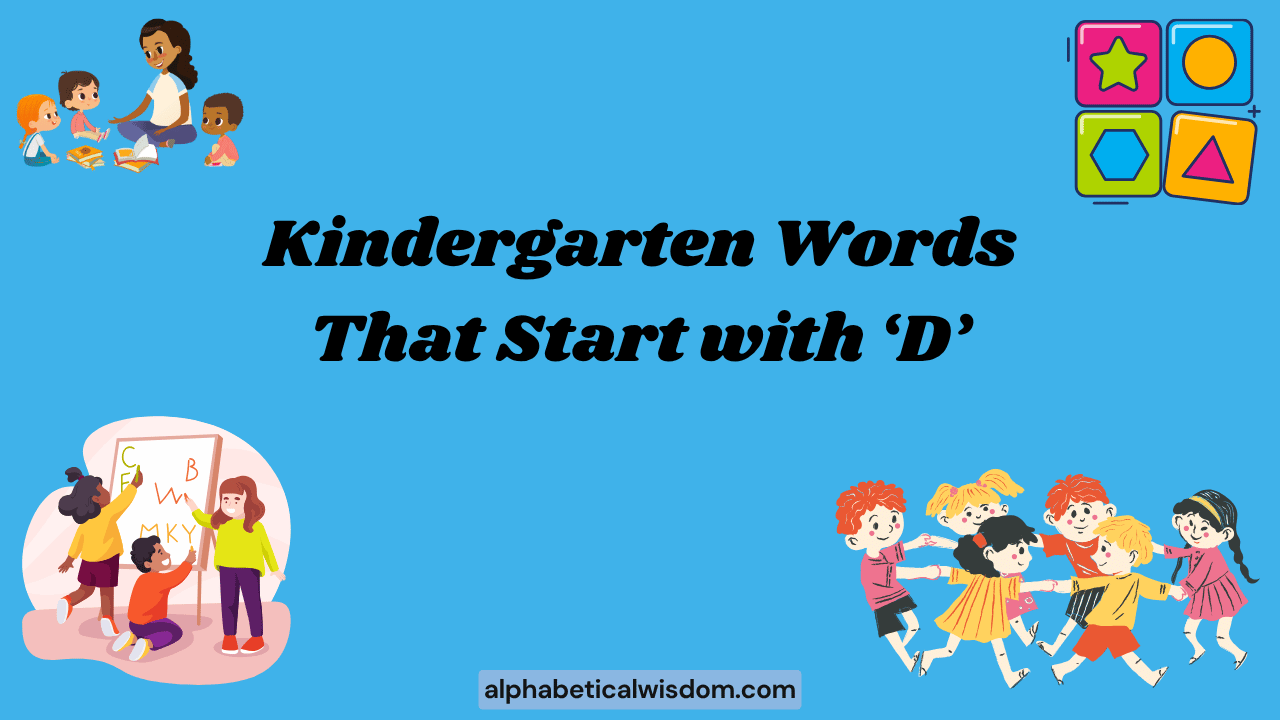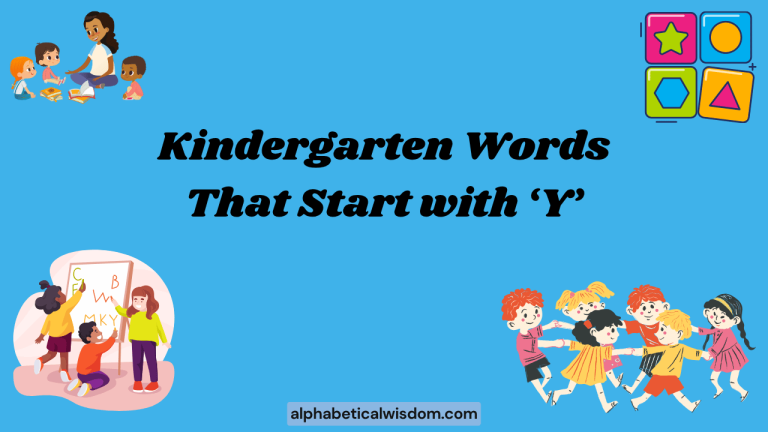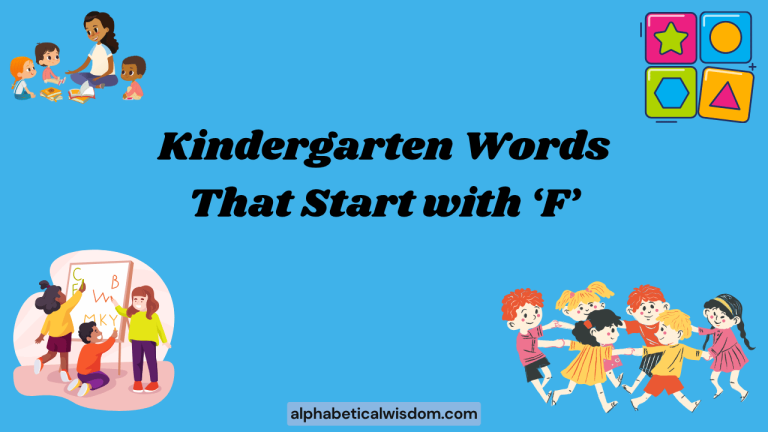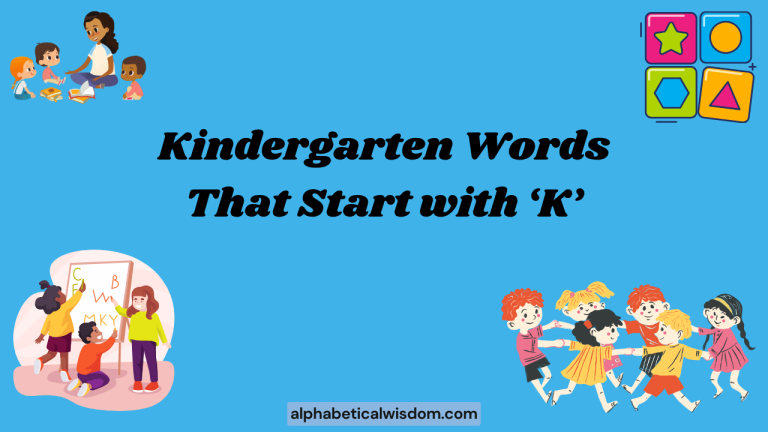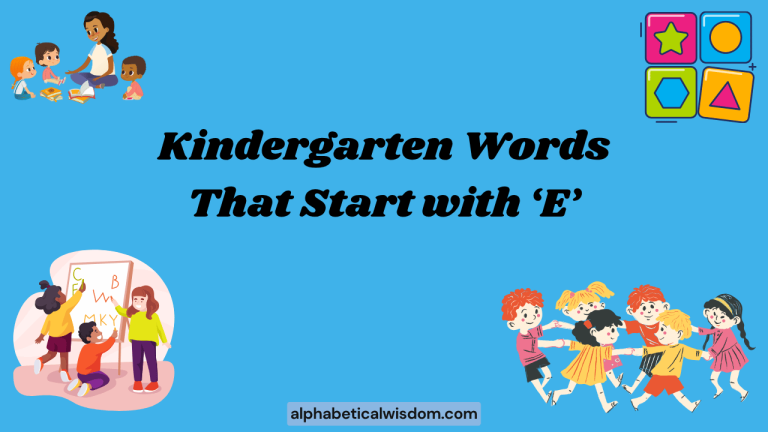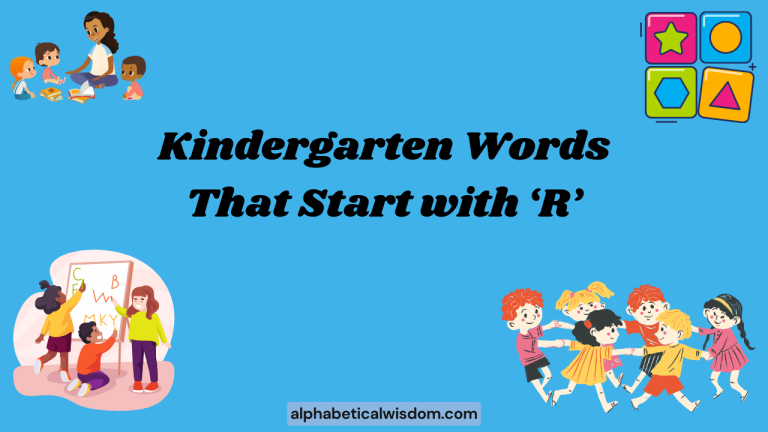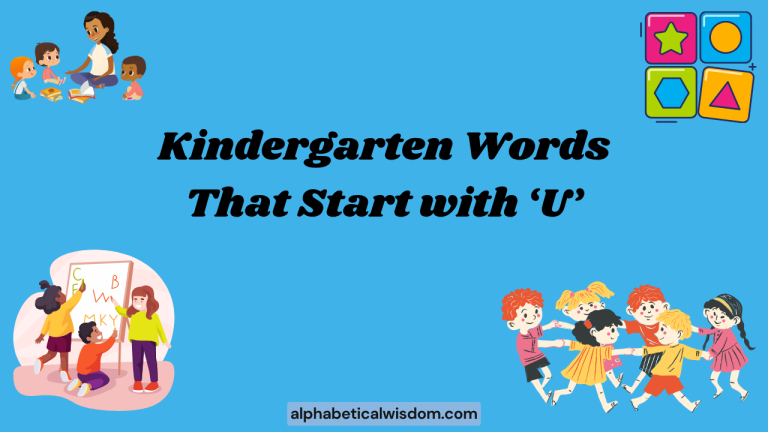Kindergarten Words That Start With D: A Comprehensive Guide
Learning new words is a fundamental part of a child’s early education, and focusing on words that start with specific letters, like “D,” can be incredibly beneficial. This article provides a comprehensive overview of kindergarten-level words beginning with the letter “D.” Understanding these words enhances vocabulary, improves reading comprehension, and builds a strong foundation for future language skills.
This guide is perfect for parents, teachers, and anyone involved in early childhood education, offering practical examples, exercises, and tips to make learning fun and effective.
Table of Contents
- Introduction
- Definition of Kindergarten Words Starting with D
- Structural Breakdown of Words Starting with D
- Types of “D” Words for Kindergarten
- Examples of Kindergarten Words That Start With D
- Usage Rules for “D” Words
- Common Mistakes When Using “D” Words
- Practice Exercises
- Advanced Topics
- Frequently Asked Questions
- Conclusion
Definition of Kindergarten Words Starting with D
Kindergarten words starting with “D” are words that are typically introduced to children around the age of five or six, during their kindergarten year. These words are selected for their simplicity, relevance to a child’s world, and ability to support early literacy skills.
They often consist of basic nouns, verbs, and adjectives that are easy to pronounce and understand.
Classification: These words can be classified into different parts of speech, including nouns (e.g., dog, doll), verbs (e.g., dance, draw), and adjectives (e.g., dark, dear). Each category plays a distinct role in forming sentences and expressing ideas.
Function: “D” words serve various functions in kindergarten-level language. Nouns name objects, people, and places; verbs describe actions or states of being; and adjectives provide descriptive details that enrich understanding. Understanding these functions is crucial for building sentence structure and improving communication skills.
Contexts: These words are used in various contexts, including storytelling, classroom activities, and everyday conversations. They help children describe their environment, express their feelings, and interact with others effectively. The more exposure children have to these words in different contexts, the better they will grasp their meanings and usage.
Structural Breakdown of Words Starting with D
The structure of words starting with “D” is generally simple, consisting of a consonant-vowel (CV) or consonant-vowel-consonant (CVC) pattern, making them easy for young children to decode and pronounce. For example, “dog” (CVC) and “dad” (CVC) are structurally straightforward.
Phonetic Structure: The initial “D” sound is a voiced alveolar stop, meaning the vocal cords vibrate, and the sound is produced by stopping the airflow with the tongue against the alveolar ridge behind the teeth. Understanding the phonetic structure helps children pronounce the words correctly and improve their phonemic awareness.
Syllable Structure: Most kindergarten “D” words are single-syllable words, which simplifies pronunciation and memorization. This also makes them easier to use in simple sentences and phrases. For example, “day,” “dig,” and “drop” are all single-syllable words.
Morphological Structure: At the kindergarten level, most “D” words are not morphologically complex. They are usually root words without prefixes or suffixes. This simplicity aids in early reading and spelling acquisition. As children progress, they will learn to add suffixes like “-ed” or “-ing” to these base words.
Types of “D” Words for Kindergarten
Nouns
Nouns are words that name people, places, things, or ideas. Kindergarten “D” nouns are typically concrete and easily relatable to a child’s everyday experiences.
Examples: Dog, doll, dad, day, door, dirt, desk, dice, dime, dinner, doctor, dream, dress, drum, duck.
Verbs
Verbs are words that describe actions or states of being. Kindergarten “D” verbs often involve simple, physical activities.
Examples: Dance, dig, draw, drop, dream, dive, do, dare, deal, decide, deliver, demand, deny, depart, describe.
Adjectives
Adjectives are words that describe or modify nouns. Kindergarten “D” adjectives help children add detail and express qualities.
Examples: Dark, dear, deep, different, difficult, dirty, dry, damp, daring, dazzling, decent, delightful, delicious, dependent, desirable.
Examples of Kindergarten Words That Start With D
Nouns Examples
Here’s a table with examples of kindergarten nouns that start with the letter “D,” along with example sentences to illustrate their usage. Understanding these nouns will help children build their vocabulary and comprehension skills.
| Noun | Example Sentence |
|---|---|
| Dog | The dog is barking loudly. |
| Doll | She loves to play with her doll. |
| Dad | My dad reads me a story every night. |
| Day | Today is a sunny day. |
| Door | Please close the door behind you. |
| Dirt | There is dirt on my shoes. |
| Desk | I keep my books on the desk. |
| Dice | We use dice to play this game. |
| Dime | I found a dime on the sidewalk. |
| Dinner | We are having dinner at six o’clock. |
| Doctor | The doctor checked my throat. |
| Dream | I had a funny dream last night. |
| Dress | She wore a beautiful dress to the party. |
| Drum | He likes to play the drum in the band. |
| Duck | The duck swam in the pond. |
| Daisy | The garden is full of daisies. |
| Dragon | The story was about a fierce dragon. |
| Dawn | We woke up at dawn to see the sunrise. |
| Deer | A deer was grazing in the field. |
| Den | The bear lives in a den. |
| Diamond | Her ring has a beautiful diamond. |
| Diary | She writes in her diary every day. |
| Digger | The construction workers used a digger. |
| Dill | We added dill to the soup. |
| Dolphin | The dolphin jumped out of the water. |
Verbs Examples
The following table provides examples of kindergarten verbs that start with the letter “D,” along with example sentences. Using these verbs in sentences will help children understand actions and improve their sentence construction skills.
| Verb | Example Sentence |
|---|---|
| Dance | I like to dance to music. |
| Dig | Let’s dig a hole in the sand. |
| Draw | I can draw a picture of a house. |
| Drop | Be careful not to drop the glass. |
| Dream | I dream of flying in the sky. |
| Dive | He can dive into the pool. |
| Do | I have to do my homework. |
| Dare | I dare you to try this new food. |
| Deal | Let’s deal the cards for the game. |
| Decide | We need to decide where to go. |
| Deliver | The mailman will deliver the letters. |
| Demand | The baby will demand attention. |
| Deny | You cannot deny what you did. |
| Depart | The train will depart soon. |
| Describe | Can you describe your favorite toy? |
| Design | I will design a new robot. |
| Destroy | The storm can destroy the sandcastles. |
| Detect | The dog can detect the scent of treats. |
| Determine | We need to determine the answer. |
| Develop | The plant will develop new leaves. |
| Devour | He will devour the pizza. |
| Dictate | The teacher will dictate the sentences. |
| Differ | Our opinions may differ. |
| Diminish | The lights will diminish slowly. |
| Dip | I will dip the cookie in milk. |
Adjectives Examples
This table showcases examples of kindergarten adjectives starting with the letter “D,” along with example sentences to illustrate their use. Learning these adjectives will help children describe nouns more effectively and enrich their descriptive language.
| Adjective | Example Sentence |
|---|---|
| Dark | The room is dark at night. |
| Dear | This is my dear friend. |
| Deep | The ocean is very deep. |
| Different | These two toys are different. |
| Difficult | This puzzle is quite difficult. |
| Dirty | My hands are dirty after playing outside. |
| Dry | The towel is dry now. |
| Damp | The grass felt damp in the morning. |
| Daring | He is a daring adventurer. |
| Dazzling | The fireworks were dazzling. |
| Decent | He made a decent effort. |
| Delightful | The party was delightful. |
| Delicious | The cake is delicious. |
| Dependent | The chick is dependent on its mother. |
| Desirable | The prize is very desirable. |
| Detailed | The report was very detailed. |
| Determined | She is determined to win. |
| Devoted | He is a devoted fan. |
| Digital | The clock is digital. |
| Diligent | The student is very diligent. |
| Dim | The light is very dim. |
| Direct | This is a direct route. |
| Discreet | He was very discreet about it. |
| Distinct | The flavors are very distinct. |
| Divine | The meal was divine. |
Usage Rules for “D” Words
When using “D” words, it’s important to follow basic grammatical rules to ensure clarity and accuracy. Here are some rules to keep in mind:
Nouns: Nouns should agree in number with the verbs they modify. For example, “The dog barks” (singular) vs. “The dogs bark” (plural).
Verbs: Verbs must agree with the subject in number and tense. For example, “I dance” (present tense) vs. “I danced” (past tense).
Adjectives: Adjectives typically precede the nouns they modify. For example, “the dark room” rather than “the room dark.”
Exceptions and Special Cases: Some “D” words may have irregular plural forms or verb conjugations. For example, “dream” can be a noun or a verb, and its past tense form is “dreamed” or “dreamt.”
Article Usage: Understanding when to use “a,” “an,” or “the” with nouns that start with “D” is crucial. Use “a” before “D” words that start with a consonant sound (e.g., a dog, a door). Use “the” when referring to a specific noun (e.g., the dog, the door).
Common Mistakes When Using “D” Words
Even native English speakers sometimes make mistakes when using “D” words. Here are some common errors and how to correct them:
Incorrect Verb Tense: Using the wrong tense of a “D” verb can change the meaning of a sentence.
- Incorrect: I dance yesterday.
- Correct: I danced yesterday.
Incorrect Adjective Placement: Placing an adjective after the noun it modifies is grammatically incorrect.
- Incorrect: The room dark is scary.
- Correct: The dark room is scary.
Incorrect Plural Forms: Not using the correct plural form of a “D” noun can lead to confusion.
- Incorrect: I saw many deers in the forest.
- Correct: I saw many deer in the forest.
Misunderstanding Homophones: Confusing words that sound alike but have different meanings and spellings. For example, “dear” (beloved) and “deer” (animal).
- Incorrect: The deer friend is coming over.
- Correct: The dear friend is coming over.
Practice Exercises
Test your knowledge of kindergarten words that start with “D” with these practice exercises. Each exercise focuses on different aspects of “D” word usage, including nouns, verbs, and adjectives.
Exercise 1: Fill in the Blanks (Nouns)
Complete the following sentences with an appropriate “D” noun from the word bank.
(Word Bank: dog, doll, door, day, dad)
| Question | Answer |
|---|---|
| 1. My __________ helps me with my homework. | dad |
| 2. The __________ barked at the mailman. | dog |
| 3. I like to play with my favorite __________. | doll |
| 4. Please close the __________ when you leave. | door |
| 5. Today is a beautiful __________. | day |
| 6. The little puppy is a golden __________. | dog |
| 7. She dresses up her favorite __________. | doll |
| 8. My __________ takes me to the park. | dad |
| 9. Every __________ is a new beginning. | day |
| 10. We painted the __________ red. | door |
Exercise 2: Identify the Verb
Identify the verb in each sentence. All verbs start with the letter “D.”
| Question | Answer |
|---|---|
| 1. I like to dance at parties. | dance |
| 2. We will dig in the garden tomorrow. | dig |
| 3. Can you draw a picture for me? | draw |
| 4. Be careful not to drop the vase. | drop |
| 5. I dream of visiting faraway lands. | dream |
| 6. I like to draw pictures of animals. | draw |
| 7. He can dig a hole very quickly. | dig |
| 8. The ballerina can dance gracefully. | dance |
| 9. She does not want to drop the ball. | drop |
| 10. I often dream of flying. | dream |
Exercise 3: Choose the Correct Adjective
Choose the correct adjective to complete each sentence.
| Question | Answer |
|---|---|
| 1. The __________ room was scary. (dark, dear) | dark |
| 2. This is my __________ friend. (deep, dear) | dear |
| 3. The ocean is very __________. (deep, dirty) | deep |
| 4. These toys are all __________. (different, difficult) | different |
| 5. The puzzle was too __________. (difficult, dry) | difficult |
| 6. I found the dark cave spooky. (dark, decent) | dark |
| 7. This is my dear grandmother. (dear, deep) | dear |
| 8. The deep sea is home to many creatures. (deep, dirty) | deep |
| 9. We have different opinions. (different, difficult) | different |
| 10. It was a difficult test. (difficult, dry) | difficult |
Advanced Topics
For more advanced learners, exploring the etymology and historical context of “D” words can provide deeper insights. Understanding how these words have evolved over time and their roots in other languages can enrich vocabulary and comprehension.
Etymology: Many English words that start with “D” have roots in Latin or Greek. For example, “describe” comes from the Latin word “describere,” meaning “to write down.”
Figurative Language: Exploring how “D” words are used in metaphors, similes, and idioms can enhance language skills. For example, “dark as night” is a common simile.
Compound Words: Learning about compound words that start with “D,” such as “daydream” or “doorbell,” can expand vocabulary and improve word recognition.
Frequently Asked Questions
Here are some frequently asked questions about kindergarten words that start with “D”:
- What are the most common “D” words for kindergarteners?
The most common “D” words for kindergarteners include dog, dad, day, doll, door, dig, draw, drop, dark, and dear. These words are frequently used in early reading materials and everyday conversations.
- How can I help my child learn “D” words?
You can help your child learn “D” words by using flashcards, reading books together, playing word games, and encouraging them to use the words in sentences. Repetition and context are key to effective learning.
- Are there any tricky “D” words that kindergarteners often confuse?
Yes, some kindergarteners may confuse words like dear and deer, as they sound similar but have different meanings. It’s important to provide clear explanations and examples to differentiate them.
- How important is it for kindergarteners to learn words starting with “D”?
Learning words starting with “D” is important because it expands their vocabulary, improves reading comprehension, and builds a strong foundation for future language development. It also helps them communicate more effectively.
- What are some fun activities to teach “D” words?
Fun activities include drawing pictures of “D” words, playing “I Spy” with objects that start with “D,” creating a “D” word scavenger hunt, and reading stories that feature “D” words prominently.
- How can I make learning “D” words engaging for my child?
Make learning engaging by incorporating games, colorful visuals, and real-life examples. Use positive reinforcement and praise to encourage your child’s efforts.
- What resources are available to help teach “D” words?
Many resources are available, including kindergarten workbooks, online educational games, flashcards, and apps. Local libraries and educational websites are also great sources of materials.
- How do I correct my child if they mispronounce a “D” word?
Gently correct your child by repeating the word correctly and encouraging them to imitate you. Provide positive feedback when they make an effort to pronounce the word correctly.
- Why are simple words like ‘D’ words important in early education?
Simple words like ‘D’ words are foundational. They act as building blocks for more complex vocabulary and sentence structures. Mastering these words gives children confidence and a solid base for literacy.
- How do ‘D’ words contribute to sentence formation in kindergarten?
‘D’ words, whether nouns (dog), verbs (dig), or adjectives (dark), provide the essential elements for constructing simple sentences. They enable children to express actions, describe objects, and convey basic ideas, promoting early communication skills.
Conclusion
Mastering kindergarten words that start with “D” is a crucial step in a child’s literacy journey. By understanding the definitions, structures, and usage rules of these words, children can enhance their vocabulary, improve their reading comprehension, and build a solid foundation for future language skills.
Through engaging activities, practice exercises, and consistent reinforcement, parents and educators can make learning “D” words a fun and rewarding experience.
Remember to use a variety of teaching methods, provide plenty of examples, and encourage children to practice using “D” words in different contexts. With patience and dedication, you can help your child confidently navigate the world of language and unlock their full potential.
Keep practicing, and watch your child’s vocabulary blossom!
